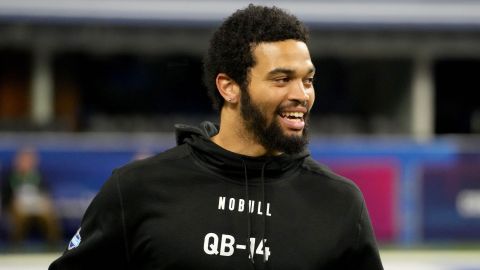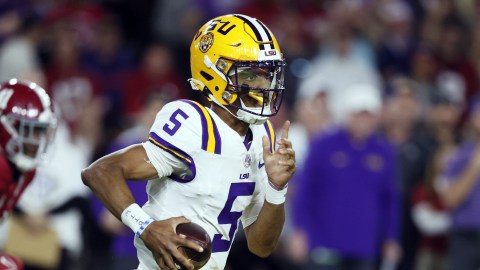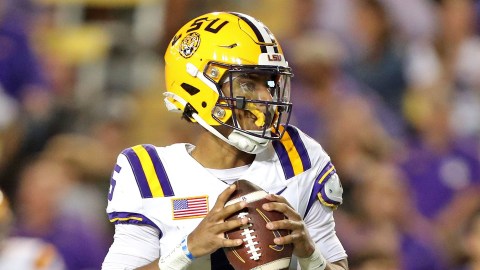 The Patriots haven't had much of a running game in recent years.
The Patriots haven't had much of a running game in recent years.
Bill Belichick doesn't seem to mind. The way he's talking, in fact, he's just fine without wide receivers, defense, kick returners — whatever. As long as the wins are rolling in, he says (and they are), he doesn't mind giving up one part of the game if it means racking up points elsewhere.
"I'm for whatever helps us win," Belichick told reporters Monday when asked about the running game's rush toward obsolescence as high-powered passing games take over the NFL. "If it's 500 quarterback sneaks, if that's the best thing for us, I'm all for it. If that's the best thing we can do to win, sign me up for it."
Tom Brady, a quarterback sneak aficionado, probably wouldn't mind that approach. But some Patriots fans continue to be troubled by the lack of a familiar running back. They want some rushing to spell the passing game and get those guaranteed yards on the ground. BenJarvus Green-Ellis, now ready to make his name as the Cincinnati Bengals' back, is the last Patriots rusher to go more than 200 carries since Corey Dillon's 2004 season, when the grind-it-out back (who came from the Bengals, mind you) went for 1,635 yards and 12 touchdowns on 345 carries.
Belichick's reasoning on not handing the ball off as much was simple Monday.
"Corey Dillon was good enough to do it," he said. "If the Corey Dillon of 2004 was on this roster, I'm sure he'd get it 300 times, too. I have not seen Corey out there today."
Fair point. When the Pats are turning to the likes of Stevan Ridley, Shane Vereen, Brandon Bolden and Danny Woodhead to split this year's load, 300-plus carries for any one back shouldn't be part of the equation. And considering the time for elite backs in the NFL has disappeared, those pining for a Patriots rushing game are seriously pushing against the grain of the modern game.
Then there's the whole part where Brady is the Patriots' quarterback. The guy has no problem breaking passing records regularly, and he's even done it without a running game to set up his play-action throws. His ability in the offense makes investing in a running game — either by salary or by touches — seem ludicrous, unless those backs are being contracted for their catches. The end of Dillon's time with New England, which started Brady's true ascent by necessity and timeliness, may have been one of the best things to happen to the Pats.
Belichick's point about Dillon didn't just bring humor to the great expectations of spring training camp. By calling up 2004, memories arise of other features of the Patriots during that year — features that, if they were employed again, could help with that thing Belichick likes so much: winning.
The 2004 season, after all, was the last time the Patriots won the Super Bowl. They've lost it twice since, both in years when Brady and friends set new benchmarks in NFL passing and receiving categories.
But the rushing game wasn't the only part of 2004's success, and it shouldn't be pined for as the Patriots try to reach the Super Bowl again. New England's return to 2004 glory depends instead on two other factors from that season that the Patriots need to rediscover: a marquee defense, and a little Troy Brown action. The good news is that the Patriots are set up to have both.
When New England rolled to three Super Bowls in four years last decade, Brady was leading the way — but he was nowhere near the quarterback he is now. Those Patriots teams instead leaned on Belichick's greatest ability: his defensive coaching prowess. He found players that fit his system and coached them well, developing hungry pieces into deep teams that could control time of possession and close out games.
Belichick's defenses began as strong collections of good players, but they soon grew into squads full of marquee names. Players had a place to prove themselves, and unknowns such as Asante Samuel made their NFL fate in the Patriots system. The defenses were strong across all positions, with statistics and wins confirming their ability.
A quick glimpse at the 2004 roster shows names that are now legendary for Patriots fans. Rodney Harrison was there, doing the dirty work. Tedy Bruschi was at peak form. Richard Seymour was a menace from defensive end, dominating with the Patriots before being sent away over salary concerns. Samuel came through as veterans Ty Law and Tyrone Poole fell to injury, starting a run that would make Samuel a must-have free agent in later years. Even a new draft pick named Vince Wilfork was making waves. And those are just a few.
Basically, the 2004 Patriots defense was a great mix of high-level talent and Belichick-groomed positioning. Belichick can pick players he likes, but the team won't excel unless it has some players with serious skills. And the Patriots can grab players with talent, but they won't go anywhere unless they fit the New England system (Adalius Thomas proves this point). The 2004 Patriots had both.
The good news for Patriots fans is that the 2012 edition may finally have both, too. New England has struggled on the defensive side in the years since the 2004 Super Bowl win. In addition to losing great players like Law, Samuel and Seymour, Belichick's hunting has brought in busts like Thomas. The Patriots just haven't had the right balance they need for a highly skilled, fear-inducing defense that executes game plans the way Belichick wants.
But this year, the defense looks to be the most promising in years. From excellent, talented draft picks (Chandler Jones, Donta Hightower) to rising legends (Jerod Mayo) to the veterans that keep the system intact (Wilfork), Belichick could have a 2004-caliber group on his hands. These guys could be ready to make their names the way the Patriots of old did in their championship years.
The second piece of what Belichick had in 2004 that he'd do well to find this year — having Troy Brown — reinforces this concept. Of course, Belichick no more wants a current Brown than he wants Dillon, but the idea is the same. What Brown was in that year was phenomenal.
In Brown, Belichick had a player who was willing to step in at any spot. Brown was the reliable receiver in the days when Brady had almost no one to throw to. He was a return man when the Patriots needed to get those special teams yards. And he was a defensive back when Law and Poole went down. Brown actually had the second-highest interception total from 2004, with three picks. He didn't just step into the secondary a la Randy Moss to bat down balls at big moments. He played and produced when needed.
The Patriots are strong enough on defense right now not to need a Brown redux, but the same spirit that made Brown such a key figure then can be summoned to make the Patriots potent now. Players like Julian Edelman have already shown a willingness to play both sides of the ball, but what Belichick and his coaches need more is a willingness across the board for all players to fit into the system wherever needed. The Patriots have loads of talent, and seeing Aaron Hernandez line up at wide receiver or fullback, or the defensive pieces shuffle around to wherever needed, would bring back the team ethos that made this organization so strong a decade ago.
Belichick would take a 2004 Dillon, and chances are, he'd take a 2004 defense or Brown, too. But he can do one better — he can make the 2012 version of this team channel all that made the 2004 team so great and ride it to similar results.



